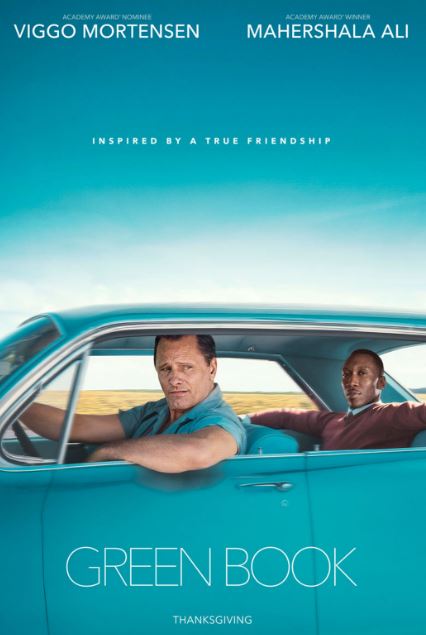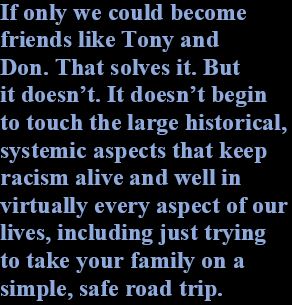In late March 2023 a group from churches in the Northern Illinois Conference of the United Methodist Church visited the Illinois Holocaust Museum to see an exhibit called The Negro Motorist Green Book and afterwards to have a discussion on Blacks in film, and, in particular, whether The Green Book movie—which won 2019’s Best Picture Oscar—did justice to the exhibit they had just seen. Not really. In fact, there was almost no relationship at all.
 The 15-minute VIDEO below is a slightly expanded version of a talk I gave after the exhibit. It set a framework for the audience and several panelists who shared their perspectives. I briefly discussed The Green Book movie in “Our ‘Green Book’ Fantasy, Plus Other Oscar Winners That Don’t Hold Up.” There I grouped it with Driving Miss Daisy and Crash, two other Oscar-winning films where race featured prominently. At the Museum I got to put it in a larger context of films which present distorted images of Blacks, Black life and American history.
The 15-minute VIDEO below is a slightly expanded version of a talk I gave after the exhibit. It set a framework for the audience and several panelists who shared their perspectives. I briefly discussed The Green Book movie in “Our ‘Green Book’ Fantasy, Plus Other Oscar Winners That Don’t Hold Up.” There I grouped it with Driving Miss Daisy and Crash, two other Oscar-winning films where race featured prominently. At the Museum I got to put it in a larger context of films which present distorted images of Blacks, Black life and American history.
I begin by talking about the film which founded modern American cinema: Birth of a Nation. In a country where racism is often spoken about as its “original sin,” it’s profoundly significant that this film is often considered the most racist ever made. But in a different way so is Gone with the Wind, which I speak about next, and also many of the films starring one of America’s sweetest sweethearts, Shirley Temple. I speak especially of one of her frequent co-stars, Steppin Fetchit, whose exaggerated portrayal of a Black servant was probably an underhanded way—a “signifying” way—of parodying what Americans thought blackness was in the first place.
The exhibit the Holocaust Museum of Illinois hosted was a traveling Smithsonian exhibit on The Negro Motorist Green Book. The book was the brainchild of New York mailman Victor Hugo Green. It was an indispensable guide helping Black Americans navigate the often unfriendly, even violent and deadly, roads of our country. It told Blacks where they could stop for gas, for food, for rest, which were often few and far between. But it’s been pointed out that in the movie The Green Book no black hands ever even touch The Negro Motorist Green Book. It’s a mere prop, resulting in yet another film where Black life is seen through white eyes, here the eyes of chauffeur Tony Lip, who has signed on to drive black musician Dr. Don Shirley around on his concert tours. It’s Viggo Mortensen’s film, and Mahershala Ali, who plays Don Shirley, wins the Oscar for best supporting actor.
 The Green Book isn’t as thoroughly a “white savior” film as The Blind Side, or The Help, or Dances with Wolves. There’s more of an exchange between the Tony Lip and Don Shirley characters. But it is on the white savior film spectrum, and Tony Lip (Viggo Mortensen’s character) does plenty of saving, including saving Don Shirley from being so separate from his own people. It’s almost as if Tony is blacker than Don Shirley is! And in the end Tony even saves Don Shirley from spending Thanksgiving alone. Talk about a film feeding us comfort food.
The Green Book isn’t as thoroughly a “white savior” film as The Blind Side, or The Help, or Dances with Wolves. There’s more of an exchange between the Tony Lip and Don Shirley characters. But it is on the white savior film spectrum, and Tony Lip (Viggo Mortensen’s character) does plenty of saving, including saving Don Shirley from being so separate from his own people. It’s almost as if Tony is blacker than Don Shirley is! And in the end Tony even saves Don Shirley from spending Thanksgiving alone. Talk about a film feeding us comfort food.
I’m not very interested in saying a movie should have done this or that. It is what it is. I’m more interested in the effects it has on its audiences. White savior films are among the most popular films of their day. They feed us the comforting thought that whiteness is still central. More than that, they comfort us by reducing racism to the level of the merely personal. If only we could become friends like Tony and Don. That solves it. But it doesn’t. It doesn’t touch the large historical, systemic aspects that keep racism alive and well in virtually ever aspect of our lives, including just trying to take your family on a simple, safe road trip.
♦ Go to the Diversity Training and Teaching page, and to the Lead Post on the anti-racism workshop “Becoming the Beloved Community,” for which I have been the main presenter. This article is also cross listed there.